2023年中考英语复习 第2部分 第5章 介词与介词短语课件(共46张PPT)
文档属性
| 名称 | 2023年中考英语复习 第2部分 第5章 介词与介词短语课件(共46张PPT) |  | |
| 格式 | pptx | ||
| 文件大小 | 273.0KB | ||
| 资源类型 | 教案 | ||
| 版本资源 | 外研版 | ||
| 科目 | 英语 | ||
| 更新时间 | 2023-06-12 16:44:35 | ||
图片预览

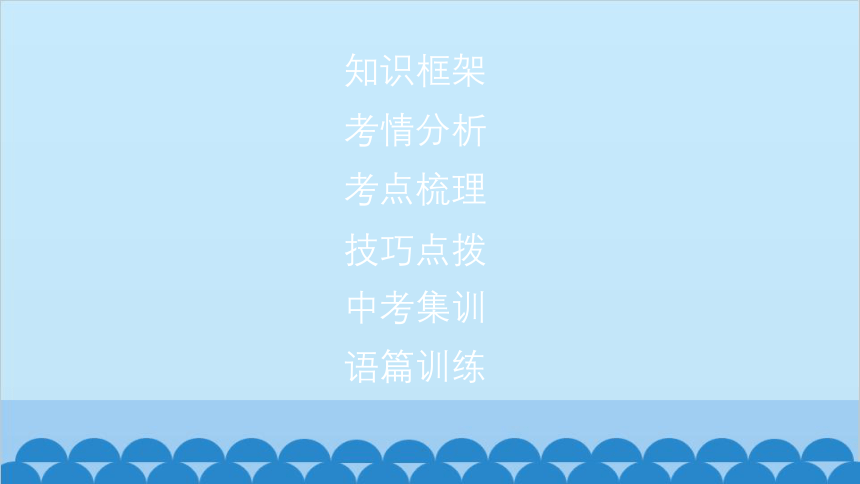
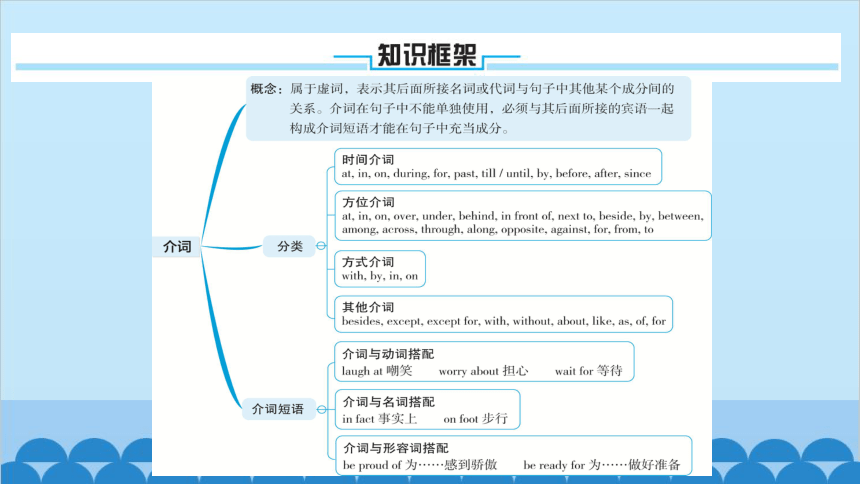

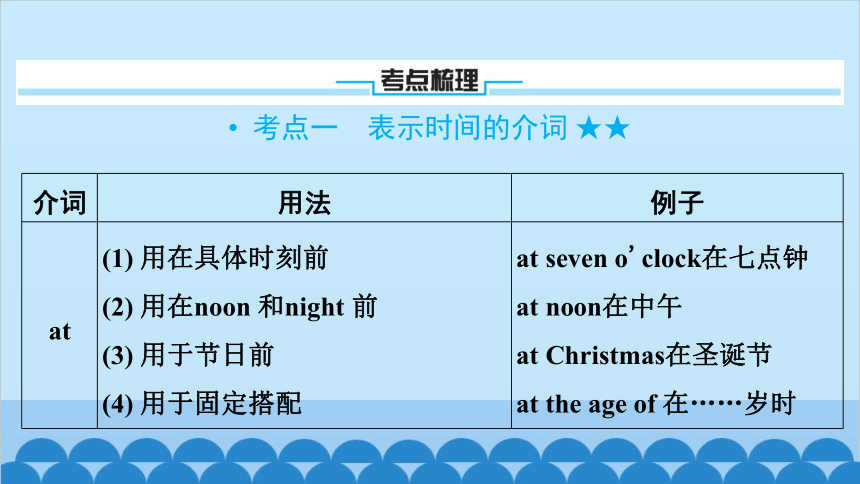
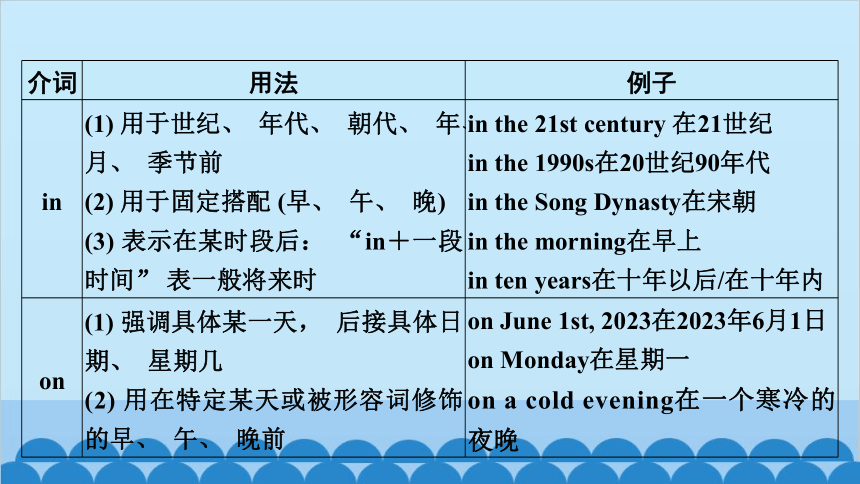
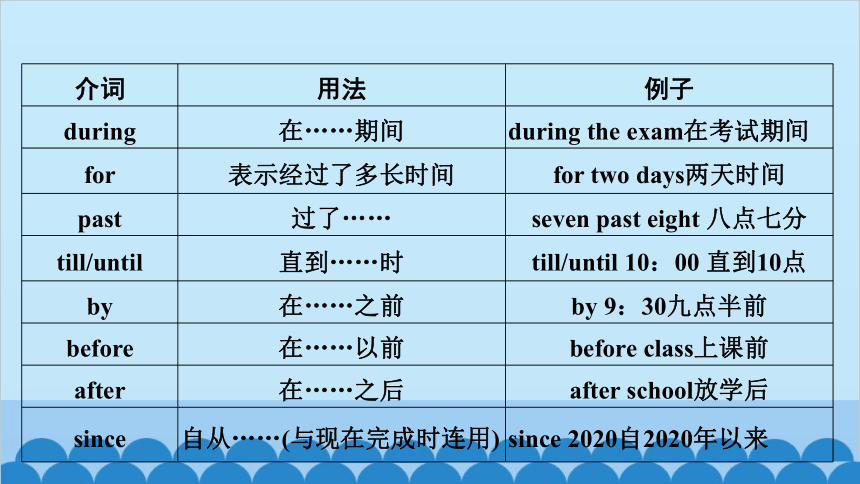
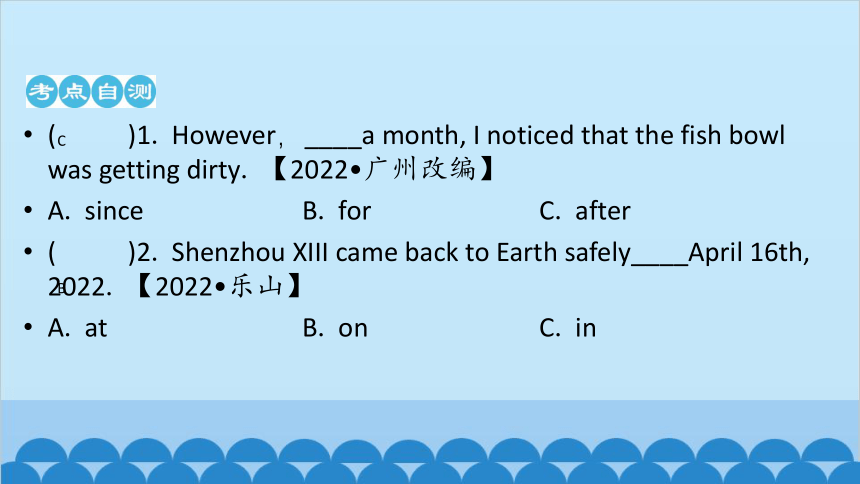
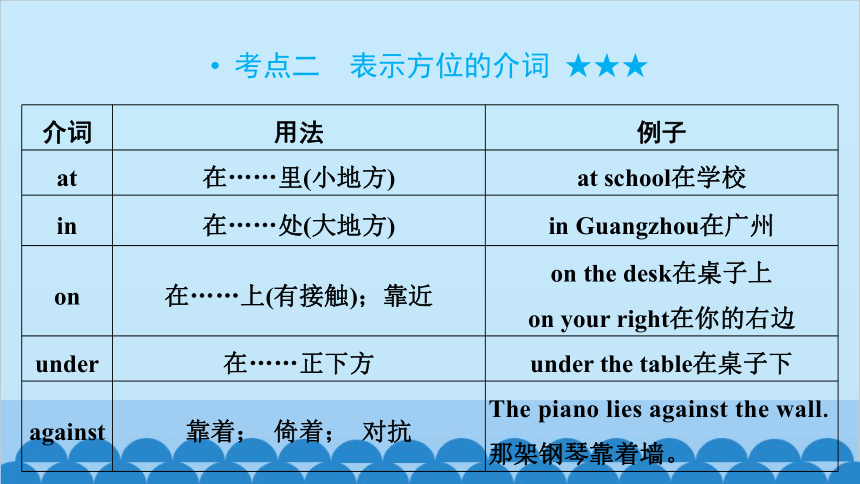
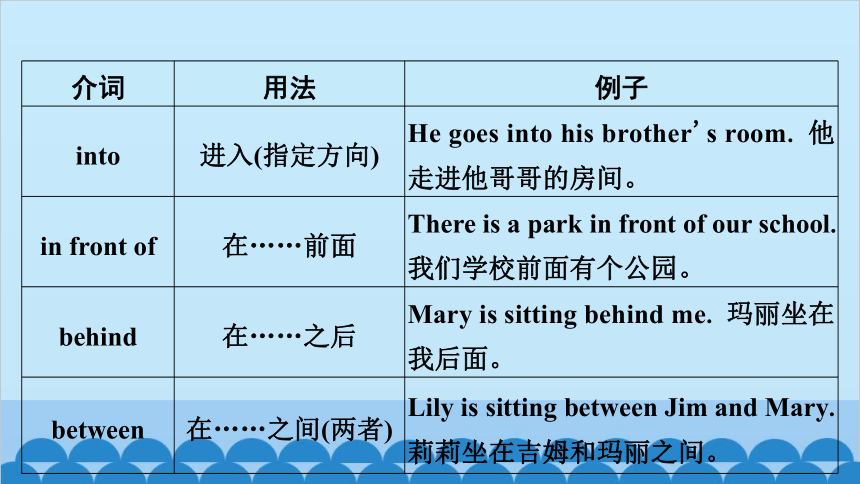
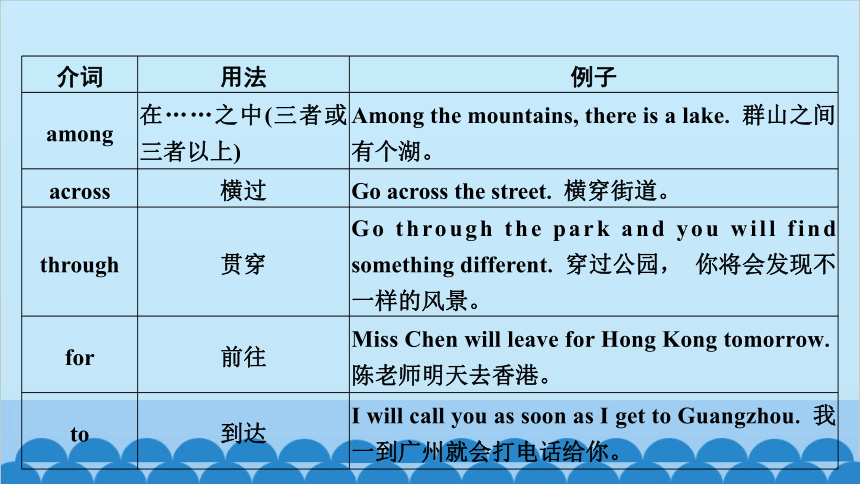
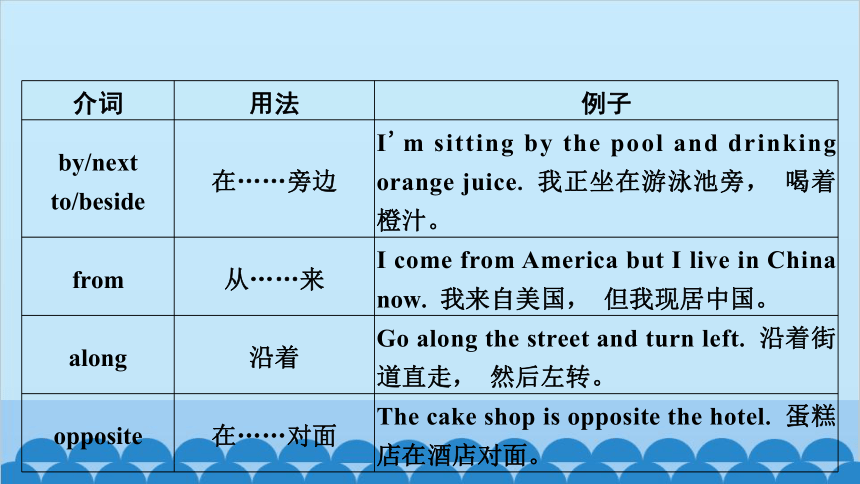
文档简介
(共46张PPT)
第二部分 语法精讲精练
第五章 介词与介词短语
知识框架
考情分析
考点梳理
技巧点拨
中考集训
语篇训练
考点 题型
语法选择 短文填空
表示方位的介词 2022 (第31题 in) 2021 (第34题 between) 2022 (第69题 in)
表示时间的介词 / 2021 (第67题 for)
2020 [第67题at (既属于时间介词的考查,
也属于介词短语的考查)]
其他介词 2020 (第31题 with) /
介词短语 / 2020 [第67题at (既属于时间介词的考查,
也属于介词短语的考查)]
分析: 广东中考近三年的语法选择和短文填空均考查了一道介词的题目, 可见介词是必考点, 而方位介词和时间介词的知识点需引起重视。
考点一 表示时间的介词 ★★
介词 用法 例子
at (1) 用在具体时刻前 (2) 用在noon 和night 前 (3) 用于节日前 (4) 用于固定搭配 at seven o'clock在七点钟
at noon在中午
at Christmas在圣诞节
at the age of 在……岁时
介词 用法 例子
in (1) 用于世纪、 年代、 朝代、 年、 月、 季节前 (2) 用于固定搭配 (早、 午、 晚) (3) 表示在某时段后: “in+一段时间” 表一般将来时 in the 21st century 在21世纪
in the 1990s在20世纪90年代
in the Song Dynasty在宋朝
in the morning在早上
in ten years在十年以后/在十年内
on (1) 强调具体某一天, 后接具体日期、 星期几 (2) 用在特定某天或被形容词修饰的早、 午、 晚前 on June 1st, 2023在2023年6月1日
on Monday在星期一
on a cold evening在一个寒冷的夜晚
介词 用法 例子
during 在……期间 during the exam在考试期间
for 表示经过了多长时间 for two days两天时间
past 过了…… seven past eight 八点七分
till/until 直到……时 till/until 10:00 直到10点
by 在……之前 by 9:30九点半前
before 在……以前 before class上课前
after 在……之后 after school放学后
since 自从……(与现在完成时连用) since 2020自2020年以来
( )1. However,____a month, I noticed that the fish bowl was getting dirty. 【2022 广州改编】
A. since B. for C. after
( )2. Shenzhou XIII came back to Earth safely____April 16th, 2022. 【2022 乐山】
A. at B. on C. in
C
B
考点二 表示方位的介词 ★★★
介词 用法 例子
at 在……里(小地方) at school在学校
in 在……处(大地方) in Guangzhou在广州
on 在……上(有接触);靠近 on the desk在桌子上
on your right在你的右边
under 在……正下方 under the table在桌子下
against 靠着; 倚着; 对抗 The piano lies against the wall. 那架钢琴靠着墙。
介词 用法 例子
into 进入(指定方向) He goes into his brother's room. 他走进他哥哥的房间。
in front of 在……前面 There is a park in front of our school. 我们学校前面有个公园。
behind 在……之后 Mary is sitting behind me. 玛丽坐在我后面。
between 在……之间(两者) Lily is sitting between Jim and Mary. 莉莉坐在吉姆和玛丽之间。
介词 用法 例子
among 在……之中(三者或三者以上) Among the mountains, there is a lake. 群山之间有个湖。
across 横过 Go across the street. 横穿街道。
through 贯穿 Go through the park and you will find something different. 穿过公园, 你将会发现不一样的风景。
for 前往 Miss Chen will leave for Hong Kong tomorrow. 陈老师明天去香港。
to 到达 I will call you as soon as I get to Guangzhou. 我一到广州就会打电话给你。
介词 用法 例子
by/next to/beside 在……旁边 I'm sitting by the pool and drinking orange juice. 我正坐在游泳池旁, 喝着橙汁。
from 从……来 I come from America but I live in China now. 我来自美国, 但我现居中国。
along 沿着 Go along the street and turn left. 沿着街道直走, 然后左转。
opposite 在……对面 The cake shop is opposite the hotel. 蛋糕店在酒店对面。
( )3. The traffic light is green. Let's go____the road. 【2022 连云港改编】
A. against B. among C. across
C
考点三 表示地理位置的介词in, on, to的用法 ★
介词 用法 例子
in 指的是在某个范围之内(范围内) Dongguan lies in the middle of Guangdong.
东莞在广东中部。
on 表示与某地接壤 Hunan is on the north of Guangdong.
湖南与广东北部接壤。
to 表示某地以外的方位 (范围外) Hainan lies to the south of Guangdong.
海南在广东南面。
( )4. Yancheng is the only city ____ China to be named after salt.
A. to B. on C. in
C
考点四 介词with和without的用法 ★★
介词 用法 例子
with 表示 “带着, 随着” Our English teacher looks at us with a smile. 我们的英语老师面带微笑地看着我们。
表示 “用, 以, 被” He cuts the apple with a knife. 他用刀切苹果。
表示 “有, 带有” I want to have some water with honey. 我想喝些蜂蜜水。
表示 “伴随, 和” Come with me. 跟我来。
介词 用法 例子
without 表示 “没有, 无, 不需” 等否定的含义 We got there without any trouble. 我们毫不费力地到了那儿。
用于在no, not, never等否定副词之后, 表示 “没有……不……, 没有……则不能……”, 强调肯定 Human can't live without air. 人离开空气不能生存。
( )5. My mother often tells me it's impolite to hit an empty bowl____chopsticks. 【2022 成都】
A. in B. on C. with
( )6. You'd better not hang out after school ____ telling your parents. They may worry about you.
A. by B. with C. without
C
C
考点五 except, besides, except for的用法 ★
介词 用法 例子
except 表示 “除了……之外”, 除外的东西不包括在内, 有否定、 排除含义, 后接名词、 代词或从句 Everyone is here except Jim. 除了吉姆之外, 其他人都在这儿。
I didn't tell him anything except that I needed the money. 我什么都没告诉他, 只是说我需要钱。
介词 用法 例子
besides 表示 “除……之外 (还有)”, 包括后面所指的内容 Fifty students are here besides Jim. 除了吉姆, 这里还有其他五十个学生。
except for 表示 “除去……之外, 只不过”, 后接短语, 引述一个相反的原因或细节, 因而部分地修正了句中的主要意思, 表 “全部与部分” 关系 The room was very cold and, except for Jack, entirely empty. 这个房间很阴冷, 而且除了杰克, 完全空荡荡的。
( )7. All of us helped to clean up the old people's home ____ Eric. He had a bad cold.
A. besides B. against C. except
C
考点六 介词的习惯性用法 ★★
1. 在树上: in the tree(本身不属于树上的物体), on the tree(树上长出来的物体, 如: 果子、 枝叶)
2. 在墙上: in the wall(嵌入墙里), on the wall(紧贴墙面)
3. by, in 与with 表示 “以, 用……” 时的区别
(1)by表示 “使用某种方式、 方法、 手段”, 后接名词、 动词-ing形式; 或接表交通工具的单数名词。
(2)in表示 “使用某种方式; 用某种语言、 语调、 颜色、 笔墨等”。
(3)with表示 “使用某种工具、 手段”, 后接具体的工具或手段。
4. of的用法
(1)表示所有关系和与之相关的其他概念, “A of B” 表示 “B的A”。如: photos of the city 城市的照片。
(2) “表示人物性格、 品德的形容词+of+名词或代词+不定式” 的用法。如: It's very kind of you to tell me. 你告诉我真是太好了。
( )8. More and more people in Huangshi choose to go to work ____bike.
A. in B. with C. by
( )9. Look! The girl ____ red is helping an old man cross the road.
A. of B. on C. in
( )10. It's cruel ____ the man to shoot at the birds with stones.
A. of B. for C. to
C
C
A
考点七 常见的介词短语 ★★★
介词短语结构 例子
动词+介词 arrive in/at到达 ask for 请求 do well in 在……做得好
go on 继续 get to 到达 hear from sb. 收到某人的来信
hear of/about 听说 help sb. with sth. 帮助某人做某事 learn from sb. 向某人学习
leave for动身去 listen to 听 look at (有意识地)看
look after照顾 look for 寻找 look like 看起来像
talk about 谈论 send for 派人去请 shout at对……大声叫喊
think of 想起 think about 考虑 turn into 把……变成
regard… as 把……当作 wait for 等待 fill with 充满
begin with 以……开始 deal with 处理 fall off 摔倒
die of/from死于 put on穿上 pass on传递
write to sb. 写信给某人 call on号召; 访问; 邀请 depend on依靠
believe in相信 laugh at嘲笑 belong to 属于
spend… on 在……上花费 prefer to 更喜欢 worry about 担心
介词短语结构 例子
介词+名词 at the end of在……的尽头 at home 在家
at once 立刻 at last 最后
by bike/bus/train骑车/乘公交车/乘火车 on foot 步行
without one's help 没有某人的帮助 with one's help 在某人的帮助下
to one's surprise使某人惊讶的是 on one's way to 在某人去某地的路上
in/on time 及时/准时 in trouble/danger 处于困难/危险中
in a hurry匆忙 in front of在……前面
for example 例如 in fact事实上
in public公开地 in person亲身
at that time 当时 by the way顺便说说
介词短语结构 例子
形容词+介词 be sorry for 对……感到抱歉 be angry with sb. 生某人的气
be afraid of 害怕 be ready for 为……做好准备
be strict with sb. 对某人要求严格 be strict in sth. 对某事要求严格
be worried about 担心 be busy with sth. 忙于做某事
be famous for因……而出名 be famous as作为……而出名
be full of充满 be good for 对……有好处
be good at擅长 be interested in对……感兴趣
be late for 迟到 be proud of 为……感到骄傲
be close to 靠近 be tired of 对……厌倦
( )11. Look at that farmer. I feel very sorry ____ him. 【2021 广州改编】
A. of B. on C. for
( )12. —Sorry, I didn't do a good job.
—Never mind. ____, you've tried your best.
A. By the way B. In total C. After all
C
C
1. 介词与语法选择
根据上下文文意, 选择合适的介词。
Wang Yiyi is an excellent Beijing Opera (京剧) artist. She was born and raised 31 a village in Hebei province. 【2022 广东】
( )31. A. in B. for C. with
解析: 根据句意可知此处表示 “她在河北省的一个村庄出生并长大”, 应用in表示 “在……处”, 故选A。
A
2. 介词与短文填空
(1) 分析句子结构判断空格处是否缺介词。
① 句子基本结构不完整, 谓语动词需由动词短语构成, 如缺少相关介词, 则谓语不完整, 如 point at, wait for等。 当句子是主系表结构时, 要考虑形容词和介词的搭配, 如: be proud of, be ready for等。
② 句子基本结构完整, 则空格及下文的内容可能作地点状语、 时间状语、 伴随状语等。 如 in Foshan, on Sunday, with+名词表伴随。
Tea is mostly produced 69 Asian countries like China and India. 【2022 广东】
解析: 分析句子结构可知, 本句的基本结构为 “主语 (Tea)+谓语 (is produced)”, 句子的基本结构是完整的, 而空格后为 “Asian countries”, 可推断空格和下文构成地点状语, 故用in 表示 “在……处”。
in
(2) 根据上下文文意, 选择符合语境的介词。
He is William, an American who has lived in China 67 33 years. 【2021 广东】
解析: 根据句意可知, 此处表示 “他是威廉, 一名已经在中国居住了33年的美国人”, 故用for表示 “经过了多长的时间”。
for
(3) 根据固定搭配确定介词。
Jane took part in a winter camp 67 the age of eight. 【2020 广东】
解析: 根据固定搭配at the age of (在……岁时) 可知, 此处填at。
at
( )1. We have history class ____ three o'clock every Friday afternoon. 【2022 北京改编】
A. at B. on C. in
( )2. —Can you tell me something about Dazhou, Lin Hui
—No problem. It's ____ the northeast of Sichuan Province and it's famous ____ its natural gas. 【2022 达州改编】
A. in; for B. in; as C. on; as
A
A
( )3. The woman stood ____ the window, watching the girls dancing outside. 【2022 凉山州】
A. with B. on C. by
( )4. ____ spring, the days are often windy and bright. It's a perfect time to fly a kite. 【2022 宿迁改编】
A. On B. In C. At
C
B
( )5. 200 families won 2021 Jiangsu Most Beautiful Families Award this year, and 15 families from Taizhou were ____ them. 【2022 泰州改编】
A. among B. between C. over
A
一、 语法选择
On a cold morning of December, my brother Rick and I were sent to Uncle Tommie's on the other side of Little Mountain to get a goose(鹅) for Christmas dinner. This long journey over the mountain was hard but worth it.
That morning, dark clouds were coming together overhead. I knew it was going to snow on the mountain. When we arrived, Uncle Tommie was already waiting 1 us. “Boys, I'm not rushing you off,” he said, “but the wind is picking up. You'd better get the goose and head for home soon.”
( )1. A. of B. for C. by
B
2 a quick thank-you and goodbye I took the goose and we left. Halfway up the mountain, it began to snow heavily. I held the goose close 3 me. An idea came 4 my mind.
( )2. A. After B. Till C. Except
( )3. A. for B. to C. at
( )4. A. from B. into C. of
A
B
B
I stepped in front 5 Rick. “You must be cold. Open your coat!” He slowly opened his coat. I placed the warm goose 6 his coat. Rick felt warmer. My plan was working.
( )5. A. before B. to C. of
( )6. A. from B. through C. in
C
C
7 the way down, I started to shiver(发抖). Rick said, “Dave. It's your turn now.” We passed the goose back and forth(来回地) 8 us all the way. Finally, we got home.
( )7. A. At B. In C. On
( )8. A. between B. among C. with
C
A
Sitting 9 the table, we explained how the goose kept us from freezing. “We may lose our life 10 him so we can't have him for dinner,” I said. Later, we named the goose Charley and he lived out his life in the yard.
( )9. A. at B. on C. in
( )10. A. besides B. with C. without
A
C
二、 短文填空
There was a story about an elephant and a fly(苍蝇). 1 a hot summer day, an elephant was standing and picking leaves from a tree. A small fly came, flying and making noise near his ear. The elephant waved it away 2 his long ears. Then the fly came again and the elephant waved it away once more.
On
with
This happened several times. Then the elephant asked the fly why he couldn't just stay in one place. The fly answered, “I am interested 3 whatever I see, hear or smell. My five senses, and everything that happens 4 me, pull me in all directions and I cannot resist(抵抗) them. What is your secret to staying cool and still(静止的)?”
in
around
The elephant stopped eating and said, “I am in control 5
myself—my senses do not tell me what to do. This helps me fix my mind on whatever I do, and so, keep my mind cool and still. Now that I am eating, I am completely enjoying eating. 6 this way, I can just fix my mind on enjoying my food.”
of
In
7 hearing these words, the fly's eyes opened wide. Then a smile appeared 8 his face. He looked 9 the elephant and realized that if he tries to have some self-control, his mind will become cool and he'll be able to stay still.
It is said that the mind is restless and pays attention 10 whatever is in front of it. But if you can control what you fix your mind on, you can control your mind.
After
on
at
to
第二部分 语法精讲精练
第五章 介词与介词短语
知识框架
考情分析
考点梳理
技巧点拨
中考集训
语篇训练
考点 题型
语法选择 短文填空
表示方位的介词 2022 (第31题 in) 2021 (第34题 between) 2022 (第69题 in)
表示时间的介词 / 2021 (第67题 for)
2020 [第67题at (既属于时间介词的考查,
也属于介词短语的考查)]
其他介词 2020 (第31题 with) /
介词短语 / 2020 [第67题at (既属于时间介词的考查,
也属于介词短语的考查)]
分析: 广东中考近三年的语法选择和短文填空均考查了一道介词的题目, 可见介词是必考点, 而方位介词和时间介词的知识点需引起重视。
考点一 表示时间的介词 ★★
介词 用法 例子
at (1) 用在具体时刻前 (2) 用在noon 和night 前 (3) 用于节日前 (4) 用于固定搭配 at seven o'clock在七点钟
at noon在中午
at Christmas在圣诞节
at the age of 在……岁时
介词 用法 例子
in (1) 用于世纪、 年代、 朝代、 年、 月、 季节前 (2) 用于固定搭配 (早、 午、 晚) (3) 表示在某时段后: “in+一段时间” 表一般将来时 in the 21st century 在21世纪
in the 1990s在20世纪90年代
in the Song Dynasty在宋朝
in the morning在早上
in ten years在十年以后/在十年内
on (1) 强调具体某一天, 后接具体日期、 星期几 (2) 用在特定某天或被形容词修饰的早、 午、 晚前 on June 1st, 2023在2023年6月1日
on Monday在星期一
on a cold evening在一个寒冷的夜晚
介词 用法 例子
during 在……期间 during the exam在考试期间
for 表示经过了多长时间 for two days两天时间
past 过了…… seven past eight 八点七分
till/until 直到……时 till/until 10:00 直到10点
by 在……之前 by 9:30九点半前
before 在……以前 before class上课前
after 在……之后 after school放学后
since 自从……(与现在完成时连用) since 2020自2020年以来
( )1. However,____a month, I noticed that the fish bowl was getting dirty. 【2022 广州改编】
A. since B. for C. after
( )2. Shenzhou XIII came back to Earth safely____April 16th, 2022. 【2022 乐山】
A. at B. on C. in
C
B
考点二 表示方位的介词 ★★★
介词 用法 例子
at 在……里(小地方) at school在学校
in 在……处(大地方) in Guangzhou在广州
on 在……上(有接触);靠近 on the desk在桌子上
on your right在你的右边
under 在……正下方 under the table在桌子下
against 靠着; 倚着; 对抗 The piano lies against the wall. 那架钢琴靠着墙。
介词 用法 例子
into 进入(指定方向) He goes into his brother's room. 他走进他哥哥的房间。
in front of 在……前面 There is a park in front of our school. 我们学校前面有个公园。
behind 在……之后 Mary is sitting behind me. 玛丽坐在我后面。
between 在……之间(两者) Lily is sitting between Jim and Mary. 莉莉坐在吉姆和玛丽之间。
介词 用法 例子
among 在……之中(三者或三者以上) Among the mountains, there is a lake. 群山之间有个湖。
across 横过 Go across the street. 横穿街道。
through 贯穿 Go through the park and you will find something different. 穿过公园, 你将会发现不一样的风景。
for 前往 Miss Chen will leave for Hong Kong tomorrow. 陈老师明天去香港。
to 到达 I will call you as soon as I get to Guangzhou. 我一到广州就会打电话给你。
介词 用法 例子
by/next to/beside 在……旁边 I'm sitting by the pool and drinking orange juice. 我正坐在游泳池旁, 喝着橙汁。
from 从……来 I come from America but I live in China now. 我来自美国, 但我现居中国。
along 沿着 Go along the street and turn left. 沿着街道直走, 然后左转。
opposite 在……对面 The cake shop is opposite the hotel. 蛋糕店在酒店对面。
( )3. The traffic light is green. Let's go____the road. 【2022 连云港改编】
A. against B. among C. across
C
考点三 表示地理位置的介词in, on, to的用法 ★
介词 用法 例子
in 指的是在某个范围之内(范围内) Dongguan lies in the middle of Guangdong.
东莞在广东中部。
on 表示与某地接壤 Hunan is on the north of Guangdong.
湖南与广东北部接壤。
to 表示某地以外的方位 (范围外) Hainan lies to the south of Guangdong.
海南在广东南面。
( )4. Yancheng is the only city ____ China to be named after salt.
A. to B. on C. in
C
考点四 介词with和without的用法 ★★
介词 用法 例子
with 表示 “带着, 随着” Our English teacher looks at us with a smile. 我们的英语老师面带微笑地看着我们。
表示 “用, 以, 被” He cuts the apple with a knife. 他用刀切苹果。
表示 “有, 带有” I want to have some water with honey. 我想喝些蜂蜜水。
表示 “伴随, 和” Come with me. 跟我来。
介词 用法 例子
without 表示 “没有, 无, 不需” 等否定的含义 We got there without any trouble. 我们毫不费力地到了那儿。
用于在no, not, never等否定副词之后, 表示 “没有……不……, 没有……则不能……”, 强调肯定 Human can't live without air. 人离开空气不能生存。
( )5. My mother often tells me it's impolite to hit an empty bowl____chopsticks. 【2022 成都】
A. in B. on C. with
( )6. You'd better not hang out after school ____ telling your parents. They may worry about you.
A. by B. with C. without
C
C
考点五 except, besides, except for的用法 ★
介词 用法 例子
except 表示 “除了……之外”, 除外的东西不包括在内, 有否定、 排除含义, 后接名词、 代词或从句 Everyone is here except Jim. 除了吉姆之外, 其他人都在这儿。
I didn't tell him anything except that I needed the money. 我什么都没告诉他, 只是说我需要钱。
介词 用法 例子
besides 表示 “除……之外 (还有)”, 包括后面所指的内容 Fifty students are here besides Jim. 除了吉姆, 这里还有其他五十个学生。
except for 表示 “除去……之外, 只不过”, 后接短语, 引述一个相反的原因或细节, 因而部分地修正了句中的主要意思, 表 “全部与部分” 关系 The room was very cold and, except for Jack, entirely empty. 这个房间很阴冷, 而且除了杰克, 完全空荡荡的。
( )7. All of us helped to clean up the old people's home ____ Eric. He had a bad cold.
A. besides B. against C. except
C
考点六 介词的习惯性用法 ★★
1. 在树上: in the tree(本身不属于树上的物体), on the tree(树上长出来的物体, 如: 果子、 枝叶)
2. 在墙上: in the wall(嵌入墙里), on the wall(紧贴墙面)
3. by, in 与with 表示 “以, 用……” 时的区别
(1)by表示 “使用某种方式、 方法、 手段”, 后接名词、 动词-ing形式; 或接表交通工具的单数名词。
(2)in表示 “使用某种方式; 用某种语言、 语调、 颜色、 笔墨等”。
(3)with表示 “使用某种工具、 手段”, 后接具体的工具或手段。
4. of的用法
(1)表示所有关系和与之相关的其他概念, “A of B” 表示 “B的A”。如: photos of the city 城市的照片。
(2) “表示人物性格、 品德的形容词+of+名词或代词+不定式” 的用法。如: It's very kind of you to tell me. 你告诉我真是太好了。
( )8. More and more people in Huangshi choose to go to work ____bike.
A. in B. with C. by
( )9. Look! The girl ____ red is helping an old man cross the road.
A. of B. on C. in
( )10. It's cruel ____ the man to shoot at the birds with stones.
A. of B. for C. to
C
C
A
考点七 常见的介词短语 ★★★
介词短语结构 例子
动词+介词 arrive in/at到达 ask for 请求 do well in 在……做得好
go on 继续 get to 到达 hear from sb. 收到某人的来信
hear of/about 听说 help sb. with sth. 帮助某人做某事 learn from sb. 向某人学习
leave for动身去 listen to 听 look at (有意识地)看
look after照顾 look for 寻找 look like 看起来像
talk about 谈论 send for 派人去请 shout at对……大声叫喊
think of 想起 think about 考虑 turn into 把……变成
regard… as 把……当作 wait for 等待 fill with 充满
begin with 以……开始 deal with 处理 fall off 摔倒
die of/from死于 put on穿上 pass on传递
write to sb. 写信给某人 call on号召; 访问; 邀请 depend on依靠
believe in相信 laugh at嘲笑 belong to 属于
spend… on 在……上花费 prefer to 更喜欢 worry about 担心
介词短语结构 例子
介词+名词 at the end of在……的尽头 at home 在家
at once 立刻 at last 最后
by bike/bus/train骑车/乘公交车/乘火车 on foot 步行
without one's help 没有某人的帮助 with one's help 在某人的帮助下
to one's surprise使某人惊讶的是 on one's way to 在某人去某地的路上
in/on time 及时/准时 in trouble/danger 处于困难/危险中
in a hurry匆忙 in front of在……前面
for example 例如 in fact事实上
in public公开地 in person亲身
at that time 当时 by the way顺便说说
介词短语结构 例子
形容词+介词 be sorry for 对……感到抱歉 be angry with sb. 生某人的气
be afraid of 害怕 be ready for 为……做好准备
be strict with sb. 对某人要求严格 be strict in sth. 对某事要求严格
be worried about 担心 be busy with sth. 忙于做某事
be famous for因……而出名 be famous as作为……而出名
be full of充满 be good for 对……有好处
be good at擅长 be interested in对……感兴趣
be late for 迟到 be proud of 为……感到骄傲
be close to 靠近 be tired of 对……厌倦
( )11. Look at that farmer. I feel very sorry ____ him. 【2021 广州改编】
A. of B. on C. for
( )12. —Sorry, I didn't do a good job.
—Never mind. ____, you've tried your best.
A. By the way B. In total C. After all
C
C
1. 介词与语法选择
根据上下文文意, 选择合适的介词。
Wang Yiyi is an excellent Beijing Opera (京剧) artist. She was born and raised 31 a village in Hebei province. 【2022 广东】
( )31. A. in B. for C. with
解析: 根据句意可知此处表示 “她在河北省的一个村庄出生并长大”, 应用in表示 “在……处”, 故选A。
A
2. 介词与短文填空
(1) 分析句子结构判断空格处是否缺介词。
① 句子基本结构不完整, 谓语动词需由动词短语构成, 如缺少相关介词, 则谓语不完整, 如 point at, wait for等。 当句子是主系表结构时, 要考虑形容词和介词的搭配, 如: be proud of, be ready for等。
② 句子基本结构完整, 则空格及下文的内容可能作地点状语、 时间状语、 伴随状语等。 如 in Foshan, on Sunday, with+名词表伴随。
Tea is mostly produced 69 Asian countries like China and India. 【2022 广东】
解析: 分析句子结构可知, 本句的基本结构为 “主语 (Tea)+谓语 (is produced)”, 句子的基本结构是完整的, 而空格后为 “Asian countries”, 可推断空格和下文构成地点状语, 故用in 表示 “在……处”。
in
(2) 根据上下文文意, 选择符合语境的介词。
He is William, an American who has lived in China 67 33 years. 【2021 广东】
解析: 根据句意可知, 此处表示 “他是威廉, 一名已经在中国居住了33年的美国人”, 故用for表示 “经过了多长的时间”。
for
(3) 根据固定搭配确定介词。
Jane took part in a winter camp 67 the age of eight. 【2020 广东】
解析: 根据固定搭配at the age of (在……岁时) 可知, 此处填at。
at
( )1. We have history class ____ three o'clock every Friday afternoon. 【2022 北京改编】
A. at B. on C. in
( )2. —Can you tell me something about Dazhou, Lin Hui
—No problem. It's ____ the northeast of Sichuan Province and it's famous ____ its natural gas. 【2022 达州改编】
A. in; for B. in; as C. on; as
A
A
( )3. The woman stood ____ the window, watching the girls dancing outside. 【2022 凉山州】
A. with B. on C. by
( )4. ____ spring, the days are often windy and bright. It's a perfect time to fly a kite. 【2022 宿迁改编】
A. On B. In C. At
C
B
( )5. 200 families won 2021 Jiangsu Most Beautiful Families Award this year, and 15 families from Taizhou were ____ them. 【2022 泰州改编】
A. among B. between C. over
A
一、 语法选择
On a cold morning of December, my brother Rick and I were sent to Uncle Tommie's on the other side of Little Mountain to get a goose(鹅) for Christmas dinner. This long journey over the mountain was hard but worth it.
That morning, dark clouds were coming together overhead. I knew it was going to snow on the mountain. When we arrived, Uncle Tommie was already waiting 1 us. “Boys, I'm not rushing you off,” he said, “but the wind is picking up. You'd better get the goose and head for home soon.”
( )1. A. of B. for C. by
B
2 a quick thank-you and goodbye I took the goose and we left. Halfway up the mountain, it began to snow heavily. I held the goose close 3 me. An idea came 4 my mind.
( )2. A. After B. Till C. Except
( )3. A. for B. to C. at
( )4. A. from B. into C. of
A
B
B
I stepped in front 5 Rick. “You must be cold. Open your coat!” He slowly opened his coat. I placed the warm goose 6 his coat. Rick felt warmer. My plan was working.
( )5. A. before B. to C. of
( )6. A. from B. through C. in
C
C
7 the way down, I started to shiver(发抖). Rick said, “Dave. It's your turn now.” We passed the goose back and forth(来回地) 8 us all the way. Finally, we got home.
( )7. A. At B. In C. On
( )8. A. between B. among C. with
C
A
Sitting 9 the table, we explained how the goose kept us from freezing. “We may lose our life 10 him so we can't have him for dinner,” I said. Later, we named the goose Charley and he lived out his life in the yard.
( )9. A. at B. on C. in
( )10. A. besides B. with C. without
A
C
二、 短文填空
There was a story about an elephant and a fly(苍蝇). 1 a hot summer day, an elephant was standing and picking leaves from a tree. A small fly came, flying and making noise near his ear. The elephant waved it away 2 his long ears. Then the fly came again and the elephant waved it away once more.
On
with
This happened several times. Then the elephant asked the fly why he couldn't just stay in one place. The fly answered, “I am interested 3 whatever I see, hear or smell. My five senses, and everything that happens 4 me, pull me in all directions and I cannot resist(抵抗) them. What is your secret to staying cool and still(静止的)?”
in
around
The elephant stopped eating and said, “I am in control 5
myself—my senses do not tell me what to do. This helps me fix my mind on whatever I do, and so, keep my mind cool and still. Now that I am eating, I am completely enjoying eating. 6 this way, I can just fix my mind on enjoying my food.”
of
In
7 hearing these words, the fly's eyes opened wide. Then a smile appeared 8 his face. He looked 9 the elephant and realized that if he tries to have some self-control, his mind will become cool and he'll be able to stay still.
It is said that the mind is restless and pays attention 10 whatever is in front of it. But if you can control what you fix your mind on, you can control your mind.
After
on
at
to
同课章节目录
- 词法
- 名词
- 动词和动词短语
- 动词语态
- 动词时态
- 助动词和情态动词
- 非谓语动词
- 冠词
- 代词
- 数词和量词
- 形容词副词及其比较等级
- 介词和介词短语
- 连词和感叹词
- 构词法
- 相似、相近词比较
- 句法
- 陈述句
- 一般疑问句和否定疑问句
- 特殊疑问句及选择疑问句
- 反意疑问句
- 存在句(There be句型)
- 宾语从句
- 定语从句
- 状语从句
- 主谓一致问题
- 简单句
- 并列句
- 复合句
- 主谓一致
- 主、表语从句
- 名词性从句
- 直接引语和间接引语
- 虚拟语气
- 感叹句
- 强调句
- 倒装句
- 祈使句
- 句子的成分
- 句子的分类
- 题型专区
- 单项选择部分
- 易错题
- 完形填空
- 阅读理解
- 词汇练习
- 听说训练
- 句型转换
- 补全对话
- 短文改错
- 翻译
- 书面表达
- 任务型阅读
- 语法填空
- 其他资料
